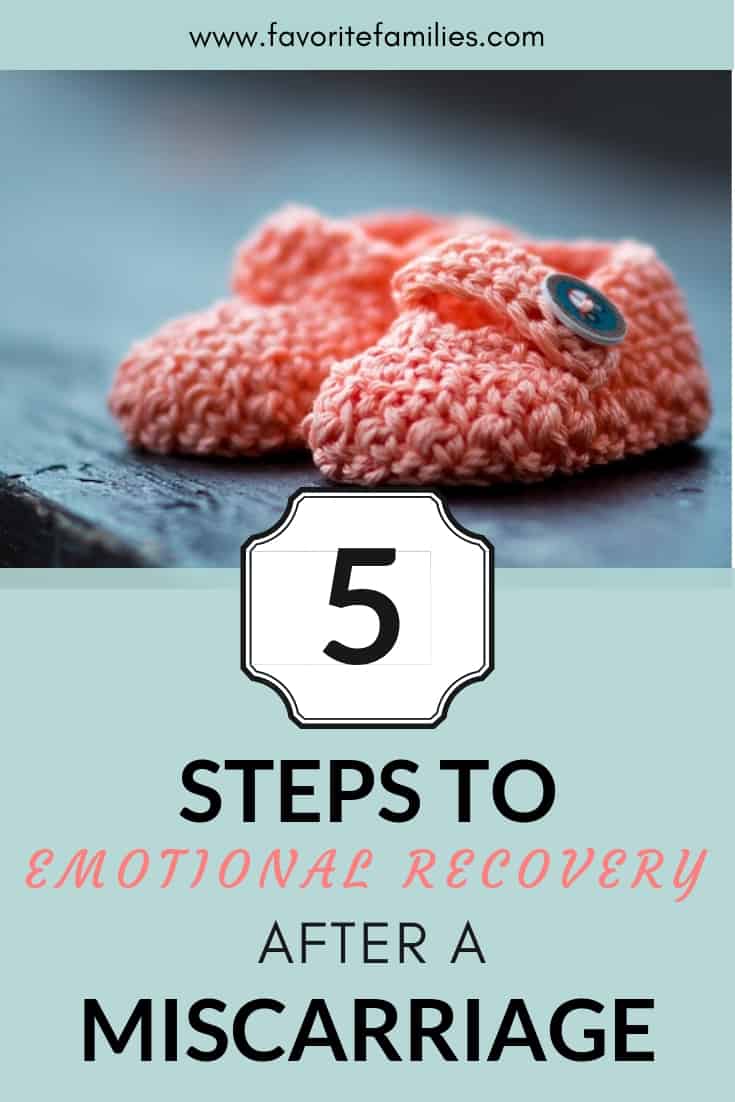
In the days & weeks following a miscarriage, life can feel like a swirl of chaos and emotions. Losing your baby is heartbreaking. And if you’re reading this right now because you have experienced a miscarriage, I want you to know that my heart goes out to you.
I have experienced the pain of miscarriage and the loss of my sweet baby will always be part of who I am. (Read my miscarriage journey here). I’m so sorry for your loss, Mama. As you begin to move forward in the process of grieving and healing, I want you to know that I see you. You are valued. Your needs are important. Your grief is real. And I pray for God’s comfort to surround you on this journey of healing.
So how do you move forward from the pain & devastation that is miscarriage? There’s no magic formula for “getting over it,” because it’s just too deep and too real to be treated that way. But through my own grief journey and in working with others who have lost little ones, I have found that these 5 things truly help the process.
It’s important to know that grief can take a variety of forms and often expresses itself differently in different stages of the grieving process. Psychiatrist Elisabeth Kubler Ross has proposed 5 Stages of Grief that many people experience. The parentheses are my own explanations.
Stage 1: Denial (The initial shock of what’s happened).
Stage 2: Anger (Feelings of injustice, this shouldn’t have happened)
Stage 3: Bargaining (Trying to make sense of what happened & why)
Stage 4: Depression (Deep feelings of loss, sadness and what could have been)
Stage 5: Acceptance (Choosing to move forward in healing)
Not everyone follows these stages in order or experiences all of them, but they are all NORMAL responses to loss. I’m going to weave aspects of these throughout the steps outline below.
STEP ONE: Acknowledge the Reality of Your Baby
Your baby matters. One of the hardest parts about moving forward after a miscarriage can be the fact that you never got to hold your little one in your arms.
When you lose someone you love, like a parent or spouse or friend, the world seems to understand and acknowledge that loss in a more substantial way. But when you lose a tiny person you never met, it can be difficult to know how to grieve. But the sense of loss you’re feeling is just as real and genuine and valuable.
When I lost my sweet baby to miscarriage, I was heartbroken. And the fact that the world continued on as usual around me made me feel left behind, sometimes even forgotten. But I was deeply impacted by a single nurse who reached out to me.
As I was sitting on a cold, wooden bench, awaiting blood results that would confirm what I already knew was happening, she stopped. She leaned down to my level and looked me straight in the eyes, staring right into my soul, and said, “Your baby matters. Give yourself time to grieve, because your baby’s life is just as important and just as meaningful as anyone else’s. And don’t let anyone tell you otherwise.”
That nurse touched my heart like nobody else in that swarm of medical professionals could, that awful day in March, 2012. There has been a stigma in our society for so many years that prevents women from openly acknowledging and grieving the legitimacy of their baby that was lost, especially when miscarrying in the first trimester.
But in my many heartfelt conversations with mothers who have experienced miscarriage, stillbirth, and the loss of a child, this is what I have learned: There is never a good time to lose your baby.
Your love for your child, whether newly conceived, in your arms, or graduating high school, is just as real and beautiful and authentic. Every. Precious. Life. Matters. Your baby’s life, as long or as short as it was, means something. Your baby’s life is worth acknowledging…worth celebrating…and worth grieving.
One of the first and most important steps in the recovery process is simply to allow yourself to embrace the fact that your baby existed, and that your baby matters. Not only that…You. Are. A. Mother. Whether you already have or will ever have other children, you are a mother. And you always will be.
STEP TWO: Make Meaning of the Loss
Bargaining is the 3rd stage Kubler Ross talks about, but it can really happen before, during or after the actual miscarriage. This is the “shoulda, coulda, woulda” part. We think through what happened and how we *think* it could have been prevented.
Sometimes it even involves bargaining with a higher power, like “God, if you just stop this from happening, I will do….whatever.” This is a raw and natural reaction to the pain of loss. And it’s really important not to get stuck here.
When I miscarried, I blamed myself for everything I could have possibly done wrong or not done right….Did I eat the wrong thing? Work too hard? Did my stress cause this? Did my job cause this? I obsessed over the details over and over again in my head, trying to figure out a cause for this tragedy through which I was living. This can drive. you. crazy.
It’s normal to struggle with feelings of guilt or confusion or desperately wanting to blame somebody or something….ANYTHING. But this won’t help you heal. It will only make you bitter. Because no matter what happened, it’s not your fault.
It’s not your spouse’s fault or your baby’s fault or the doctor’s fault or God’s fault that this happened. It just did. Sometimes terrible things happen, because we live in a world that is broken and imperfect.
And even if there is something to blame for what happened, holding onto it won’t help you heal. It’s okay to feel angry, but don’t let your anger win. Blaming is only going to lead to bitterness. It’s okay to feel confused. But not every question you have needs an answer.
Let go of the blame, shame, guilt, and fear. Choose to release yourself, your spouse, your environment, God, and anyone or anything else from the responsibility of what happened. This is the only way to truly move forward.
It doesn’t have to make sense. Let your heart space belong to the beauty of your little one’s life, and not the anger of why this happened. Let your heart heal.
STEP THREE: Give Yourself Time to Grieve
Every loss of someone we love deserves a time to grieve. Don’t let anyone tell you that you should move on more quickly than you’re ready to. The more we stuff our grief and try to move on, the more we risk our heartbreak rupturing in the future in unexpected ways.
Your grief as a mother who lost a child is just as legitimate and just as valuable as anyone who has lost someone they love. Your heart needs to grieve.
You may have all kinds of feelings swirling in your heart right now. As hard as it may be, let yourself feel them. Don’t swallow them. Don’t stuff them. Don’t discredit them. Don’t ignore them. Give them space.
Stage 2 of grief is anger. Let yourself get angry. It’s perfectly okay to be mad that you don’t get to hold your little one! It’s even okay to feel like this is SO unfair. Like everything should have been different, because it should have. But don’t direct your anger at anyone in particular. Just embrace the feeling that this is not how you wanted it to be.
Depression is the 4th stage. When we hear that word, we can have all kinds of associations with it. What this really means here is a deep sadness. It’s. Okay. To. Be. Sad. Don’t run from it, embrace it.
It’s GOOD to cry. Your tears will wash the interior of your soul. They will honor the life of your baby with their authenticity. Cry alone and cry in community.
If you’re married, cry with your spouse. Hold each other. Talk about what you wanted to do…to hold your child, to dream a future for him, to smile into her eyes and tell her what she means to you.
If you have other children, cry with them. They are grieving too. Being strong for your family doesn’t mean ignoring your feelings. It means having the courage to walk the journey of grief and hardship together, instead of alone. And letting it bring you closer together rather than driving you apart.
Grieving together is one of the best ways to do this. Tell your other kids how much you loved their little brother/sister. How your heart feels sad that you didn’t get to play together. And cry with them.
We recently lost my mother-in-law. My daughter has been having a hard time with the loss, but hasn’t really been able to cry. One evening, as I was sitting at the kitchen table, I told my daughter how my heart felt sad at not having her with us anymore. I told her what I loved about her “Mamaw” and I felt my own tears begin to rise to the surface.
For a minute, I thought about suppressing them, but I chose to release them. I began to cry in front of my daughter and it unlocked her own tears that have been “stuck.” We held each other and cried together and it was healing for both of us. Give your kids the gift of healthy grieving. It’s okay for them to see you cry and to cry with you. Then invite them into the process of healing and remembering.
STEP FOUR: Remember Your Little One
This looks different for each person. When the time was right, a few months after I miscarried, my husband picked out a special necklace for me that represented the life of our sweet baby. It was a tangible symbol that I wore daily for a long time, as my heart continued to heal. I still cherish that necklace and keep it safe, but I don’t need to wear it every day anymore.
If you feel comfortable, choose a name for your baby. It’s okay if you don’t know the gender. Maybe you have a sense about what the gender was, or you can choose a name that could apply to either gender. Whether you share the name with others or just whisper it between you and your spouse or a close friend you trust, it adds legitimacy to the life of your little one in a special way.
Some people choose to plant a tree or set up a scholarship fund or even simply recognize the day each year and do something special together to honor the lost life of their little one. It’s up to you to decide, but this is an intentional way to acknowledge the fact that your baby matters and your life has forever been marked by his or her existence.
STEP FIVE: Begin to Move Forward
There is no one way to grieve, or one timeline that works for everyone. Don’t expect yourself to just “get over it” because someone else you know did.
Everyone’s grief journey is different. For me, the baby I lost was my first child. I didn’t have other children to hold and snuggle. I didn’t know if I’d ever even be able to carry a pregnancy to term. We had also been wanting to have children for a long time and this caught us completely off guard. So this loss hit me really hard.
Some people are ready to try again for another baby right away. It took us 4 months before we were ready to start trying again. For others, it’s longer. Don’t rush the process. Talk to your spouse, give yourself time, and wait until you’re ready.
I was thrilled to conceive our rainbow baby, Gwen. But even as I felt her vibrant life growing inside me, a part of my heart was still grieving. It’s okay to feel both joy and sadness.
According to Kubler Ross, the 5th stage of grieving is acceptance. As your heart heals and time goes on, the pain will decrease.
But even 6 years later, I still find myself caught up in moments of grief, sometimes at very unexpected times. When this happens, allow yourself to mourn again. I have a friend who also lost a baby in her first trimester and was heartbroken.
Although everyone’s experience is different, there can be a shared bond between moms who have walked through similar losses. Find some of these moms and connect with them.
On October 21st last year, what would have been our baby’s due date, I texted my mom friend and shared my grief over the baby I never got to hold in my arms. For a brief moment, our hearts connected over our sweet little ones and my heart felt safe and known.
No matter how many years go by, it will always be OKAY for you to experience moments of grief as you remember your precious baby. Let it be so. Not everyone in your life may understand what you have walked through in the same way, but surrounding yourself with even one or two people who do can be a powerful part of your healing journey. Take care of your heart and find safe, meaningful, forward-moving ways to grieve, because remember…
Your baby matters, and so do you.
What’s your story? I’d love to hear about you, your little one’s life, and how you are doing either in the comments or by email.
Like this post? Would you help me spread hope by sharing it on Facebook, Pinterest, Twitter, or emailing it to a mom who may benefit? Thank you!

P.S. Help spread hope by sharing this post on Facebook, Pinterest, Twitter, or emailing it to a mom who needs encouragement!
P.P.S. Be sure to subscribe to our weekly newsletter for more strategies for a happy family!
